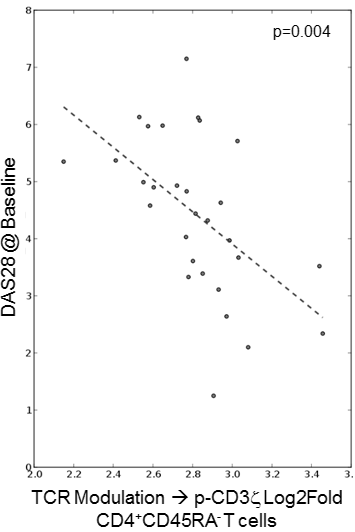Session Information
Session Type: Abstract Submissions (ACR)
Background/Purpose: Biomarkers reflecting immune function and associating with disease activity can help stratify rheumatoid arthritis (RA) patients (pts) in practice and in clinical trials. Single cell network profiling (SCNP) is a multiparametric flow cytometry-based assay that measures induced changes in intracellular signaling proteins, providing a functional measure of pathway activity and immune networking in multiple cell subsets. In this study the association between disease activity as measured by DAS28 and signaling profiles in specific subsets of monocytes, B, and T cells from RA pts were assessed in an effort to identify biomarkers for immune monitoring.
Methods: SCNP of 42 nodes (combinations of modulator and intracellular readout) within 21 immune cell subsets was performed on PBMCs from 181 RA pts collected before initiating treatment with either methotrexate or a biologic agent for clinical indications and 10 age- and gender-matched healthy donors. RA pts were from the Treatment Efficacy and Toxicity in Rheumatoid Arthritis Database and Repository (TETRAD). Clinical data included DAS28 at enrollment (prior to starting the index drug). Statistical analyses, including Wilcoxon test and linear regression as appropriate, were performed using data from the 117 evaluable donors with no recent use of a biologic to identify signaling that associated with baseline disease activity, after controlling for age.
Results: This systems biology study identified several candidate signaling biomarkers associated with disease activity. As expected in donors with high disease activity (DAS28 > 5.1), unmodulated cells had significantly elevated levels of p-S6, p-AKT, and p-p38 compared to donors with lower disease activity. Specific modulated signaling pathways responsive to IFNa (p-STAT5 in B cells, p=0.03) and T cell receptor modulation (p-LCK, p-ZAP70, p-PLCg2, and p-CD3z; e.g. p-CD3z in CD4+CD45RA– T cells, p=0.004) showed signaling inversely correlated to the continuum of disease activity. The reduced signaling associated with higher disease activity potentially reflects disease processes including negative feedback from prior in vivo exposure or alterations in components necessary for signaling pathway integrity. Interestingly, signaling induced by TNFa (monocytes, p=0.0004) and IL-6 (central memory CD4– T cells, p=0.01) was higher in donors with high disease activity, which is consistent with these established treatment modalities.
Conclusion: Characterization of intracellular signaling within immune cells from RA patients provides insights into disease pathology and possible therapeutic targets. Functional pathway analysis of RA pts PBMCs has revealed potential predictive biomarkers that, once validated in future studies, may enable novel means for immune monitoring and therapeutic selection for the individual patient.
Disclosure:
J. Ptacek,
Nodality, Inc.,
3;
R. Hawtin,
Nodality, Inc.,
3;
B. Louie,
Nodality, Inc.,
3;
E. Evensen,
Nodality, Inc.,
3;
J. Cordeiro,
Nodality, Inc.,
3;
B. Mittleman,
Nodality, Inc.,
3;
M. Atallah,
Nodality, Inc.,
3;
A. Cesano,
Nodality, Inc.,
3;
C. O. Bingham III,
None;
S. Cofield,
None;
J. R. Curtis,
None;
M. I. Danila,
None;
R. A. Furie,
None;
M. Genovese,
None;
M. C. Levesque,
None;
L. W. Moreland,
None;
P. A. Nigrovic,
None;
J. R. O’Dell,
None;
W. H. Robinson,
None;
N. A. Shadick,
Crescendo Biosciences, Medimmune, BMS, Genentech, Abbott and AMGEN,
2;
E. W. St Clair,
None;
C. C. Striebich,
None;
G. M. Thiele,
None;
P. K. Gregersen,
None;
S. L. Bridges Jr.,
None.
« Back to 2013 ACR/ARHP Annual Meeting
ACR Meeting Abstracts - https://acrabstracts.org/abstract/novel-biomarkers-from-peripheral-blood-mononuclear-cells-indicate-disease-activity-in-rheumatoid-arthritis-patients/

